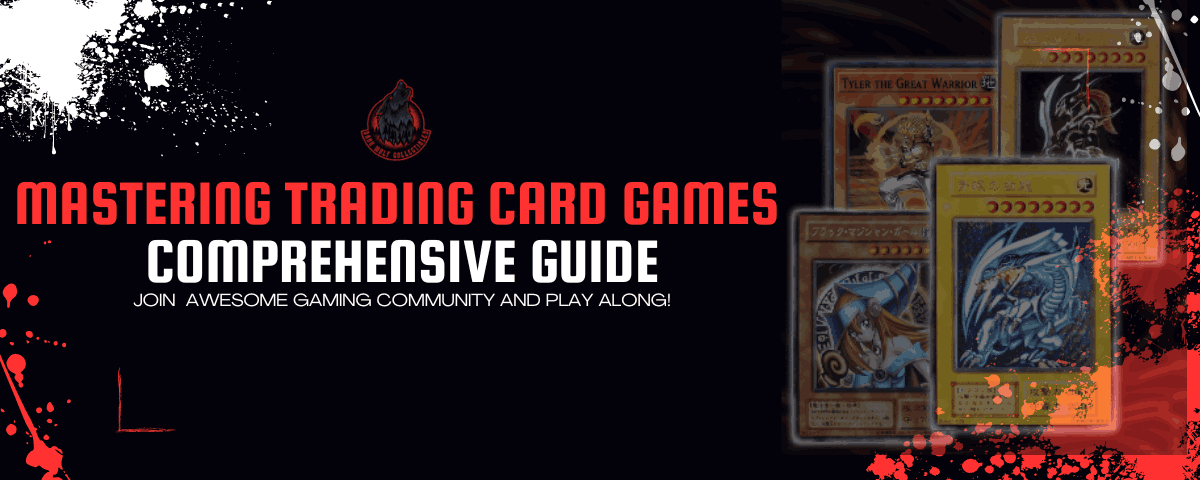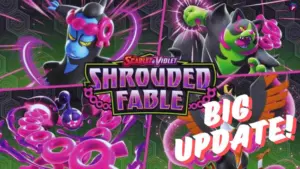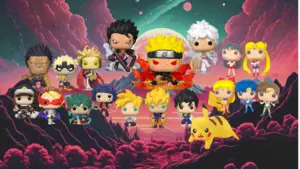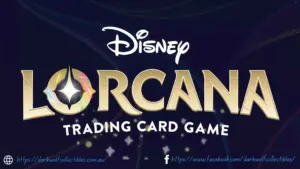Hey there, fellow TCG enthusiast! Are you ready to embark on an exciting journey through the captivating realm of trading card games (TCGs)? Whether you’re a seasoned player looking to brush up on your skills or a newcomer eager to dive into this dynamic world, this comprehensive guide is here to equip you with all the essential knowledge and strategies you need to thrive in the TCG universe.
I. A Journey Through the World of TCG
What are Trading Card Games?
Trading card games are like a mix of strategy, luck, and collecting cool cards all rolled into one. Basically, you build a deck of cards with different powers and abilities, then battle it out with your opponent to see who comes out on top. It’s kind of like a more fun version of chess, where you never know what card you’ll draw next. Plus, there’s the thrill of opening up a new pack and finding that rare, shiny card you’ve been hunting for. Whether you’re into Pokémon, Magic: The Gathering, or Yu-Gi-Oh, trading card games are a great way to test your skills and have a blast with friends. Just be careful, it’s easy to get addicted to the rush of a good duel!
What captivating journey unfolds behind the origins of trading card games?
Back in the 19th century, folks were already getting into the groove with games like “The Game of Politics” and “The Game of Authors.” These games were a hit among players who loved collecting and swapping cards.
But hold onto your hats because the real game-changer came in 1993 with the birth of “Magic: The Gathering” by the brainy Richard Garfield. This game shook things up by letting players customize their decks with all sorts of cards boasting unique powers and abilities. It was a breath of fresh air in the gaming scene and kickstarted the craze for collectible card games (CCGs).
“Magic: The Gathering” paved the way for a whole new wave of trading card games. Think “Pokémon Trading Card Game,” “Yu-Gi-Oh!,” and “Hearthstone” – all big hitters in the world of CCGs. These games have only gotten bigger and better over the years, drawing in millions of players worldwide who love duking it out in tournaments and swapping cards like there’s no tomorrow.
The story behind trading card games is a rollercoaster ride of innovation, creativity, and a tight-knit community of players who are constantly pushing the boundaries of what’s possible in the gaming universe. It’s a journey you won’t want to miss out on!
Why is it important to learn the basic rules of trading card games?
One of the main reasons why it’s important to learn the basic rules of trading card games is to ensure that everyone is on the same page. Imagine sitting down to play a game with a friend, only to realize that you have completely different interpretations of the rules. This can lead to confusion, frustration, and ultimately a less enjoyable gaming experience for both parties.
By taking the time to learn the basic rules of a trading card game, you can avoid misunderstandings and disputes during gameplay. This will help you and your opponent focus on strategy and skill, rather than arguing over the rules.
Additionally, It enhances gameplay by focusing on strategy and skill, revealing the game’s depth and complexity, and unlocking new tactics.
Whether you’re looking to join a local gaming group or participate in tournaments, having a strong understanding of the rules will help you engage with the community and build relationships with other players.
What are the key differences between physical and digital TCG?
If you’re a fan of trading card games, you may have noticed that there are two main types: physical and digital. So, what are the key differences between the two?
- Format: Physical trading card games involve actual, tangible cards that you can hold in your hand and trade with others in person. Digital trading card games, on the other hand, are played online or through apps, with virtual cards that you collect and play with on a screen.
- Accessibility: Another key difference is accessibility. Physical trading card games require you to purchase physical packs of cards, which can sometimes be expensive and hard to find. Digital trading card games, on the other hand, are often free to play and easy to access on various devices.
- Gameplay: Gameplay can also vary between the two types. Physical trading card games may have more complex rules and mechanics, as well as the social aspect of playing face-to-face with friends. Digital trading card games may offer more convenience and faster gameplay, with automated features and online matchmaking.
Ultimately, whether you prefer physical or digital trading card games comes down to personal preference. Some people enjoy the nostalgia and tactile experience of physical cards, while others appreciate the convenience and accessibility of digital games. Whichever you choose, both types offer unique and enjoyable gaming experiences.
II. Getting Started
Choosing the right card game
So, you’ve decided to embark on your TCG journey, but where do you begin? Well, the first step is choosing the right trading card game for you. With so many options out there, from the classics to the latest releases, it can be overwhelming. Don’t worry, though; we’ll walk you through popular and notable TCGs, giving you an overview of their unique features, and gameplay mechanics, and even showcasing some rare cards to pique your interest.
- Pokémon TCG
Welcome to the world of Pokémon, a global phenomenon that has captured fans worldwide. From the beloved video games to the animated series and movies. The Pokémon Trading Card Game (TCG) is no exception, offering fans a new way to immerse themselves in the Pokémon universe.
Gameplay Mechanics:
In the Pokémon TCG, players take on the role of Pokémon Trainers, using their decks of cards to battle against each other. The game mirrors the Pokémon universe, with players building decks around their favorite Pokémon creatures and using them to battle their opponents.
Key gameplay mechanics include the energy system, where players must attach energy cards to their Pokémon to power their attacks. Each Pokémon belongs to a specific type, with strengths and weaknesses that players must strategize around. Evolution mechanics allow players to evolve their Pokémon into more powerful forms, adding depth to gameplay and strategy.
Impact and Legacy:
The Pokémon Trading Card Game has had a huge impact on gaming and pop culture. Do you know those iconic cards like Charizard and Pikachu? They’re basically the face of the franchise now. People from all over the world come together at tournaments and events to show off their skills and love for Pokémon. It’s not just a game – it’s a whole community! The TCG has even inspired fans to go out and become real-life Pokémon Trainers. It’s pretty cool how something as simple as a card game can have such a big influence, right?
- One Piece TCG
Set sail for adventure in the world of One Piece, where pirates, devil fruits, and epic battles await. The One Piece TCG captures the essence of the beloved anime and manga series, allowing fans to experience their favorite moments and characters in a whole new way.
Unique Features:
In the One Piece TCG, players assemble crews of characters from the series, each with their own unique abilities and strengths. The game introduces innovative mechanics like the bounty system, where players earn rewards for defeating powerful opponents, and treasure cards that offer valuable bonuses and advantages in battle.
Community and Collecting:
The One Piece TCG has cultivated a dedicated community of fans who come together to celebrate their love for the series. Whether it’s through events, tournaments, or just trading cards, there’s always something fun happening. And let’s not forget about the thrill of collecting rare and valuable cards – it’s like a treasure hunt! With so many epic battles and unforgettable moments, the One Piece TCG truly lets fans dive deep into the amazing world of One Piece.
- Dragon Ball Super Card Game
The Dragon Ball Super Card Game traces its roots back to the iconic anime and manga series, Dragon Ball. With its revival and resurgence in popularity, the Dragon Ball Super Card Game has captured the hearts of fans old and new, offering an exciting and immersive way to experience the world of Dragon Ball.
Battle System:
In the Dragon Ball Super Card Game, players take on the roles of powerful warriors from the Dragon Ball universe, using their decks of cards to engage in epic battles. The game introduces unique mechanics like the energy system, leader cards that represent iconic characters from the series, and fusion and transformation aspects that allow players to unleash devastating attacks and abilities.
Artwork and Nostalgia:
One of the highlights of the Dragon Ball Super Card Game is its stunning card artwork, featuring beloved characters and iconic moments from the series. Players can relive classic Dragon Ball moments as they collect and play their favorite cards, adding an extra layer of nostalgia and excitement to the gameplay experience.
- Other Notable Anime TCGs
- Yu-Gi-Oh!: The classic series continues to have a significant impact on TCGs, with its iconic monsters and thrilling duels captivating fans around the world.
- Cardcaptor Sakura: Explore the magical world of Cardcaptor Sakura and the enchanting Clow Cards, offering a unique and whimsical TCG experience.
- Digimon TCG: With its resurgence in popularity, the Digimon TCG offers fans a chance to collect and battle with their favorite digital monsters, drawing comparisons to Pokémon and carving out its own unique niche in the TCG landscape.
- Naruto TCG: With its loyal fan base and unique mechanics, the Naruto TCG offers fans a chance to immerse themselves in the world of ninjas, with iconic characters and thrilling battles that capture the spirit of the beloved anime and manga series.
Collecting and Trading
So, you’ve got your eye on that shiny Charizard card or that elusive Black Lotus – but how do you get your hands on it? Well, my friends, let me introduce you to the world of trading, buying, and selling in the TCG community.
- Explaining Trading, Buying/Selling, and the Secondary Market
In the world of card games, trading refers to the exchange of cards between players. It’s a great way to expand your collection, complete a set, or simply connect with other players in the community.
But what if you’re looking to buy or sell cards? Enter the secondary market, where collectors and vendors come together to buy, sell, and trade cards outside of official channels, often done through online platforms or local game stores. The secondary market plays a significant role in determining the value of cards, with rare and sought-after cards fetching high prices among collectors.
2. Grasping the Importance of PSA Grading in TCG Collecting and Investing
PSA Grading, which stands for Professional Sports Authenticator, is a third-party authentication and grading service that evaluates the condition and authenticity of trading cards. This process involves experts examining the card’s surface, edges, corners, and centering to determine its overall condition and assign it a grade on a scale from 1 to 10.
Here’s why it is important:
- Adds Credibility and Value to Cards: When a card receives a high grade from PSA, it signifies that the card is in top-notch condition and has been verified as authentic. This can be crucial when buying, selling, or trading cards, as collectors are willing to pay a premium for cards that have been professionally graded.
- Evaluate Card Condition Consistently: This helps to eliminate any discrepancies or disagreements between buyers and sellers regarding the condition of a card. With a PSA grade, you can be confident in knowing exactly what you are getting and the true value of your card.
- Protect Your Investment: Having your cards graded and encapsulated in a tamper-evident case, you can ensure that your valuable cards are preserved and protected from damage or tampering. This can be especially important for rare or high-value cards that you want to keep in pristine condition.
3. Purchasing Starter Decks or Booster Packs
Now, let’s talk about getting your collection off the ground. Starter decks and booster packs are like the bread and butter of TCG collecting – they’re your ticket to building a diverse and exciting collection of cards.
Starter decks are pre-built decks designed to give newcomers a taste of the game’s mechanics and strategies. They’re a great starting point for beginners looking to dip their toes into the world of TCGs without feeling overwhelmed.
On the other hand, booster packs are like little treasure chests waiting to be opened. Each pack contains a random assortment of cards, ranging from common to rare, with the chance of scoring that elusive ultra-rare card that’ll make your friends green with envy.
4. Understanding the Different Types of Cards
Now, let’s get down to brass tacks – understanding the different types of cards you’ll encounter in your TCG adventures.
- Creature cards – These bad boys are the backbone of your deck, packing a punch with their attacks and abilities.
- Spell cards – powerful one-shot effects that can turn the tide of battle in an instant. From fireballs to healing spells, spell cards offer a wide range of strategic options for savvy players.
- Trap cards – sneaky little buggers that lie in wait to spring a nasty surprise on your opponent. Whether it’s a hidden pitfall or a devious trap, trap cards add an extra layer of strategy to your gameplay.
Learning the Game’s Terminology
One of the first steps to becoming a TCG master is familiarizing yourself with key terms and concepts. Let’s break it down for you:
- Deck: Your deck is the collection of cards that you use to play the game. Most TCGs have a minimum and maximum deck size, so make sure you’re following the rules when building your deck.
- Hand: Your hand is the cards that you currently hold and can play during your turn. Managing your hand effectively is crucial to success in TCGs.
- Mana/energy: Many TCGs use a resource system, such as mana or energy, to cast spells or summon creatures. Make sure you have enough mana/energy to play the cards in your hand.
- Attack/defense: These terms are pretty self-explanatory. When you attack, you’re trying to damage your opponent, and when you defend, you’re trying to protect yourself.
- Turn: A turn consists of playing cards, attacking, and making strategic decisions. Knowing when to play your cards and when to hold back is key to winning TCG matches.
- Topdeck: When you draw the perfect card at the perfect moment, it’s called a topdeck. It can turn the tide of a game in an instant.
- Meta: The meta refers to the current popular strategies and decks in the TCG community. Keeping up with the meta can help you stay competitive and adapt your own deck accordingly.
These are just a few of the key terms and concepts you’ll encounter in the world of TCGs. As you play more and get involved in the community, you’ll learn even more terms and tactics. Don’t worry if it feels like a lot to take in at first. Just keep playing, learning, and enjoying yourself, and before you know it, you’ll be talking like a TCG pro.
III. General Gameplay Mechanics
Understanding the Objective
First things first, let’s get clear on the goal of the game. Every TCG has its own unique objective, whether it’s reducing your opponent’s health to zero, capturing specific objectives, or outlasting your opponent in a battle of attrition. Understanding the objective sets the stage for your gameplay strategy, so make sure you’ve got a solid grasp on what you’re aiming for.
Different TCGs come with different win conditions, so it’s essential to familiarize yourself with the rules of the game you’re playing. Whether it’s collecting victory points, completing specific tasks, or achieving a specific milestone, knowing how to secure that sweet, sweet victory is key to becoming a TCG master.
Turn Structure
In most TCGs, a turn is broken down into several phases, each with its own unique set of rules and actions. By mastering each phase of the turn, you can gain a competitive edge and outmaneuver your opponents. Let’s break it down step by step:
- Draw Phase: The turn begins with the player drawing a card from their deck. This is a crucial step as it determines the resources available to the player for the rest of the turn.
- Main Phase: This is where the player can play cards from their hand, such as creatures, spells, or other abilities. This is the meat of the turn where strategic decisions are made, and the player sets up their board state for the upcoming battle.
- Combat Phase: If the game involves battling creatures, this is where the action happens. Players can choose to attack with their creatures, block incoming attacks, and use various abilities to gain the upper hand in combat.
- End Phase: Once all actions have been taken, the turn ends, and any effects that trigger at the end of the turn are resolved. Players may also discard excess cards if they have reached their hand limit.
Card interactions and mechanics
When cards clash on the battlefield, conflicts and effects must be resolved. Whether it’s calculating damage, negating spells, or triggering powerful abilities, understanding how these interactions play out can turn the tide of battle in your favor.
Grasping the intricacies of card abilities and effects is essential for strategic gameplay. From understanding keywords and symbols to predicting your opponent’s moves, mastering card mechanics is the key to staying one step ahead of the competition.
IV. Strategic Gameplay
Balancing different card types and abilities
- Consider the types of cards you want to include in your deck – Creatures, spells, artifacts – each card type brings its own strengths and weaknesses to the table. Experiment with different combinations to find what works best for your playstyle.
- Abilities you want your cards to have – Do you want a deck focused on brute force, with powerful creatures and devastating attacks? Or maybe you prefer a more strategic approach, with cards that manipulate the board and disrupt your opponent’s plans.
Whatever your preference, it’s crucial to strike a balance between different card types and abilities. A deck that’s too focused on one aspect of gameplay may struggle in certain situations, so aim for versatility and adaptability in your card selection.
Bonus Tip: Test, Test, Test!
Once you’ve built your deck, don’t be afraid to put it to the test. Play practice games against friends or opponents online, and see how your deck performs in real-world scenarios. Pay attention to what works well and what doesn’t, and don’t be afraid to make adjustments as needed.
Mastering gameplay tactics
- Assessing the Board State: Assess the cards in play, focusing on positioning, health points, buffs, and debuffs to plan your next move effectively. Identify threats and opportunities to stay ahead of your opponent.
- Making Strategic Decisions Based on Resources: Utilize mana, cards in hand, and those in play to make calculated decisions. Maximize success by leveraging resources wisely, whether it’s casting spells, summoning creatures, or waiting for the right moment to strike. Adapt, stay focused, and have fun mastering TCG gameplay tactics.
Adapting Opponents’ Strategy
Every player has their own unique approach to the game, but there are some common tactics and playstyles that you’re likely to encounter and adapt on the battlefield.
For example, some players prefer to take an aggressive approach, rushing in with powerful creatures and launching relentless attacks. Others may favor a more defensive strategy, focusing on building up their defenses and waiting for the perfect opportunity to strike. And let’s not forget about control decks, which are all about disrupting your opponent’s plans and keeping them on their toes.
V. Advanced Concepts
Participating in Organized Play
To improve your TCG skills and meet other players, try participating in organized play. Join online communities, forums, and social media groups for tips and connections. Or, head to your local game store for tournaments and casual gaming nights or trade night events to test your skills in person. It’s a great way to level up your game and make new friends in the TCG community!
Adapting to Changes and Staying updated on the current state of the game
Adapting to changes in the game’s environment is crucial for success in TCG. As new expansions are released and new strategies are developed, players must be able to adjust their decks and gameplay to stay competitive. This can be challenging, but it is also what makes TCGs so exciting and dynamic. One way to adapt to changes in the game’s environment is to stay informed about the latest updates and developments.
So, how can you make sure you’re always in the know? Here are a few tips:
- Follow Official Websites and Social Media: The official websites and social media accounts of TCGs are treasure troves of information. They often announce new sets, rule changes, upcoming events, and even provide insights from the game developers themselves.
- Join Online Forums and Communities: Platforms like Reddit, Discord, and dedicated TCG forums are great places to discuss strategies, share insights, and learn from other players. You’ll get firsthand information about the current meta, popular deck builds, and upcoming tournaments.
- Watch Streams and Tournaments: Tuning into live streams of TCG tournaments not only lets you witness top-tier gameplay but also gives you a glimpse of the latest strategies and card interactions. You might even pick up a few tricks from the pros!
- Read Blogs and Articles: Many TCG enthusiasts and experts maintain blogs or write articles about the game. These resources often provide in-depth analysis, card reviews, and strategic advice that can help you stay ahead of the curve.
- Attend Local Events and Tournaments: If possible, participate in local TCG events and tournaments. Not only will you get hands-on experience, but you’ll also network with other players who can keep you informed about the latest happenings in the game.
VI. Unveiling the Top Recommended TCG
Pokemon TCG
With its easy-to-learn mechanics, vibrant artwork, and ever-expanding roster of Pokémon, it’s no wonder why Pokémon TCG remains a favorite among players of all ages.
The game’s accessibility makes it perfect for beginners, while its strategic depth and evolving meta keep seasoned players coming back for more. Plus, the thrill of collecting rare cards and building custom decks adds an extra layer of excitement to every match. Whether you’re a Pokémon fan or just love a good card game, Pokémon TCG is a must-try.
One Piece Card Game
What sets the One Piece Card Game apart is its unique mechanics, including character-specific abilities and dynamic combat sequences that mirror the action-packed battles from the series. With stunning artwork and rich lore to draw from, this TCG offers an unforgettable gaming experience for fans of One Piece and card game enthusiasts alike.
Dragon Ball TCG
Featuring fast-paced gameplay and strategic depth, Dragon Ball TCG offers a thrilling mix of intense combat, resource management, and tactical decision-making. Whether you’re a seasoned fighter or a newcomer to the series, the Dragon Ball TCG provides endless hours of adrenaline-fueled fun.
Yu-Gi-Oh! TCG
Since its debut in the early 2000s, Yu-Gi-Oh! has captivated audiences with its intricate gameplay, iconic monsters, and memorable characters. With its focus on strategic deck-building and high-stakes battles, Yu-Gi-Oh! TCG offers a dynamic and ever-evolving gaming experience. Whether you’re summoning Blue-Eyes White Dragon or activating trap cards to outwit your opponent, every duel is a test of skill and strategy.
Magic: The Gathering
Since its debut in 1993, Magic has set the standard for depth, complexity, and innovation in card gaming, captivating millions of players around the globe. With its vast array of cards, diverse gameplay mechanics, and rich lore spanning multiple planes of existence, Magic offers near-limitless possibilities for deck-building and strategic play. Whether you’re a casual player looking for a fun game night with friends or a competitive player vying for glory in tournaments, Magic: The Gathering has something for everyone.
VII. Conclusion
Congratulations, fellow TCG enthusiasts! You’ve learned so much about the exciting world of anime trading card games. From understanding the basics to mastering advanced strategies, you’re well-equipped to conquer the battlefield. Keep exploring, practicing, and embracing the TCG community as you continue your journey. So grab your decks, rally your teams, and dive into your next adventure with confidence. The thrill of the duel awaits you!









Leave a reply